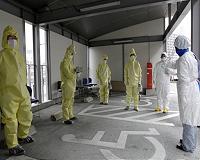| . |  |
. |
Sendai, Japan (AFP) April 8, 2011 A powerful aftershock rocked Japan's tsunami disaster zone, killing at least four and triggering new concerns over nuclear power plants in a region still grappling with an atomic emergency. Electricity was cut across a huge area of northern Japan, forcing cooling systems at three nuclear plants to switch to emergency power and plunging more than 3.3 million households into darkness late Thursday night. At least one backup supply remained online at all three plants, but the aftershock highlighted the potential risks of nuclear generation in an earthquake zone amid a battle to stabilise reactors at tsunami-hit Fukushima. Officials and reports said four people had been killed by the 7.1 magnitude tremor, which struck off the coast near Sendai -- one of the most powerful to hit Japan since the country's worst post-war disaster four weeks ago. Thursday's quake swayed buildings in the capital Tokyo, more than 300 kilometres away from the epicentre, and generated unease even well away from the coast. In the town of Kitakami, northwest of the epicentre, an AFP reporter witnessed queues forming at convenience stores as people tried to stock up anew on food, water and batteries. "It was so scary," said Kazuyuki Shiroiwa, who had been to four shops in central Kitakami in a vain effort to find batteries. "The midnight quake reminded me of the fear I felt a month ago," he said. "I'm fed up with earthquakes. No more quakes, please." Workers battling to control the stricken Fukushima Daiichi nuclear plant on the northeast coast were ordered to evacuate temporarily but have since returned, plant operator Tokyo Electric Power Co. (TEPCO) said. The evacuation order came less than 24 hours after the workers began pumping nitrogen, an inert gas, into reactor No. 1, where engineers were concerned a build-up of hydrogen might react with oxygen to cause an explosion. Work at the plant was remotely controlled and had continued uninterrupted, the company said. The loss of external power sources at Fukushima in the March 11 tsunami left reactor cores heating up uncontrollably, resulting in the world's worst nuclear emergency since Chernobyl 25 years ago. The crippled plant has leaked radiation which has made its way into tap water and farm produce, sparking food export bans covering a large area. Some highly radioactive water has leaked into the Pacific Ocean and this week TEPCO began dumping 11,500 tonnes of low-level radioactive water from the plant into the sea to free up urgently needed storage space. The move has angered the Japanese fishing industry and raised concerns in neighbouring countries including China, which on Friday urged Tokyo to ensure the marine environment was protected. The nuclear agency said Thursday's quake had knocked out some external power sources used for cooling at plants in Onagawa in Miyagi prefecture and at Rokkasho and Higashidori in Aomori prefecture. But at least one emergency power source remained operational at each, and there was no indication that the loss of regular power was causing a problem. Operator Tohoku Electric Power said some water overflowed from pools housing spent fuel at the Onagawa plant and spilled onto the floor, but that radiation levels remained normal. The Onagawa plant was already in cold shut-down, while the Higashidori plant's only reactor was under maintenance and the Rokkasho plant is a reprocessing facility. A spokesman for the plant's operator, Tohoku-Electric Power Co, said radiation levels were still "far below the level that would require us to report to authorities". Hundreds of aftershocks have rocked Japan since the 9.0 magnitude quake last month and the resulting tsunami, which killed more than 12,600 people and left around 15,000 unaccounted for. March's record quake has exacted a heavy cost on the world's number three economy, and rippled across industries worldwide as parts supplied from Japan run short. But auto giant Toyota Friday announced it would be resuming operations at all of its Japanese assembly plants on April 18. Japan said it would ease shipping restrictions on milk and some vegetables from near the Fukushima plant, while New Delhi overturned a blanket ban on importing Japanese produce. Several countries, including China, Taiwan, Singapore and the United States, have banned shipments of produce from certain Japanese prefectures near the plant, but India had been the first to announce a complete ban.
Share This Article With Planet Earth
Related Links Bringing Order To A World Of Disasters When the Earth Quakes A world of storm and tempest
 Japan nuclear plant workers evacuated: company
Japan nuclear plant workers evacuated: companyTokyo (AFP) April 7, 2011 Workers battling to control the stricken nuclear plant on Japan's northeast coast were ordered to evacuate after a 7.4 magnitude quake hit the area and a local tsunami warning was issued, operator TEPCO said Thursday. "After the earthquake and the tsunami warning, all the workers evacuated to a safe area. The company confirmed all the workers have cleared the plant safely," a spokesman for T ... read more |
|
| The content herein, unless otherwise known to be public domain, are Copyright 1995-2010 - SpaceDaily. AFP and UPI Wire Stories are copyright Agence France-Presse and United Press International. ESA Portal Reports are copyright European Space Agency. All NASA sourced material is public domain. Additional copyrights may apply in whole or part to other bona fide parties. Advertising does not imply endorsement,agreement or approval of any opinions, statements or information provided by SpaceDaily on any Web page published or hosted by SpaceDaily. Privacy Statement |